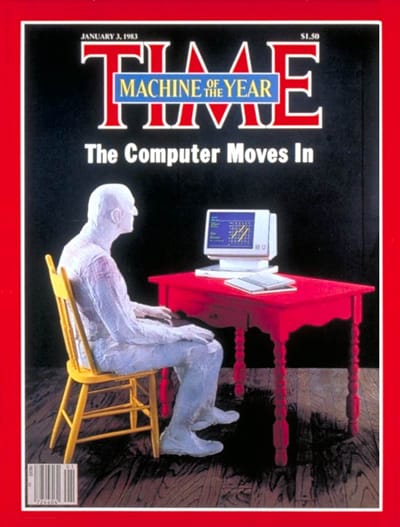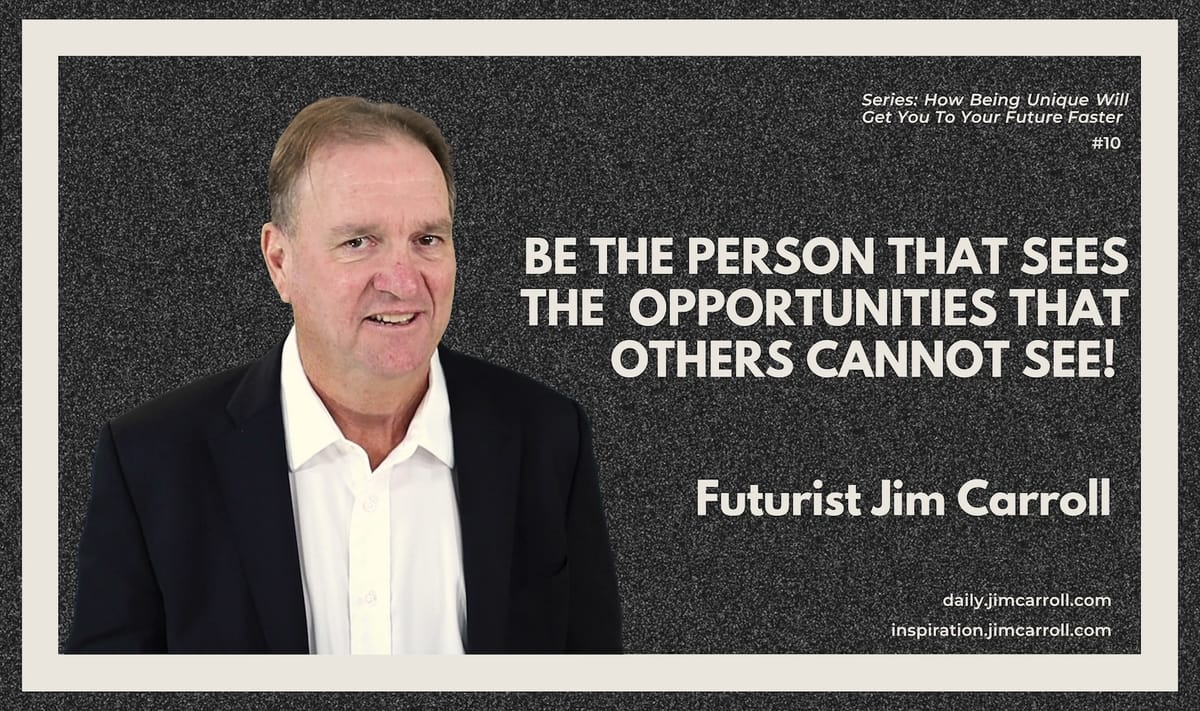"Be the person that sees the opportunities that others cannot see!" - Futurist Jim Carroll
Futurist Jim Carroll is using his Daily Inspiration blog post – one of which you are reading now – to generate material for a book he has in progress with the working title, “How to be Unique (And Why it Will Get You To Your Future Faster!). This is one of those posts.
It's 1982.

And instead of naming a "Person of the Year," Time Magazine names "The Machine of the Year." It's a nod to the potentially revolutionary impact that personal computer technology might have on our future.
And it was right about that time that I committed myself fully to taking part, determined to build a career in this fascinating new world of technology. Within a year, I was subsumed into the online world, discovering via a modem what happens when global connectivity changes forever. I knew something big was happening, and wanted to be a part of it.
I could see something that others would not yet see for a decade or more.
Do you find yourself in that situation? Seeing trends that others can't see, a future to chase that others dare not chase, a new reality that has yet to move beyond the inconceivable for most other people?
Seeing unique opportunities for tomorrow means becoming a futurist for yourself, your purveyor of a different tomorrow, a unique individual who has a lens that distorts today's reality into something different the next day. It means doubling down on your belief in the opportunities that might unfold tomorrow, rather than chasing those that might exist only within today's limited reality.
Those who invent tomorrow see the things that others don't see. Study the inventors of great ideas and new concepts, and you'll discover those who were unique. Katalin Karikó persisted in researching mRNA technology for decades despite skepticism, laying the groundwork for the miracle of today's mRNA vaccines. Stephanie Kwolek invented Kevlar while working at DuPont, recognizing its potential for lightweight, strong materials, at the same time that her peers disparaged her work. Anita Roddick founded The Body Shop, recognizing early consumer demand for ethically sourced and natural cosmetics, while others displayed skepticism of her efforts. Grace Hopper developed the first compiler for a programming language, foreseeing the need for more accessible programming tools. AClarence Birdsey developed flash-freezing techniques for food, revolutionizing food preservation and distribution. Fred Smith was faulted by his professor for his paper that outlined the future opportunity that became FedEx, seeing the potential for 'next day delivery everywhere.'
Study any great invention, and you discover the people who see things differently - and who were dismissed at the time for the errors in their vision.
Looking back at my career, I can see dozens of situations where I could see a different tomorrow. Back in 1997,. I coined the phrase 'nomadic workers,' and delivered a series of keynotes around the 'future of work.' At the time, I wrote this predictive summary.
The workforce is transformed as “nomadic workers” dominate the economy.
The number of full-time jobs will continue to dramatically shrink – yet, we are only seeing the tip of the iceberg in the change of the relationship between employer and employee. Companies will hire the best talent, regardless of where that person might be. A new form of career competitiveness is emerging, with extreme competition for this group of nomadic workers – highly skilled individuals who call the shots.
All this in the context of a global economy in which where people work won’t matter – a trend that has implications for the future of both rural and urban economies. Lifestyle choice will come to dominate career decisions.
The nomadic worker carries different attitudes towards life and work and rejects many of the currently accepted “norms” of the corporate environment. Their attitudes will revolutionize the world of work.
The result? The shape of tomorrow’s company won’t be defined by the walls in its offices – it will be defined by the reach of its computerized knowledge network, and its ability to tap into the skills and capabilities of the nomadic worker, at the right time, in the right place, for the right purpose.
That's today's reality, accelerated by the impact of the pandemic.
In 1997, the trend was, to me, blatantly obvious, and I began to watch for the implications of what would happen when career trajectories forever changed, and the structure of organizations was altered. It suggested to me that these new nomadic organizations might better align themselves for a faster tomorrow - and would change the future in many different ways. It would take others, particularly those trapped in their limited reality, a long time to discover 'the future of the organization.'
What's the lesson in all of this? Unique people see a different tomorrow - and to be unique means enhancing your ability to spot the opportunities of tomorrow, today.
Double down on your vision of tomorrow - and you'll double down on your uniqueness.
Futurist Jim Carroll has seen many trends emerge before their time in the sun.

